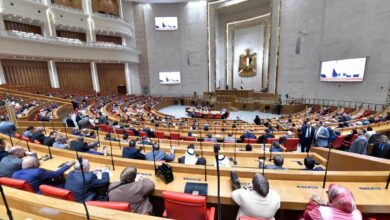
Calls for President Sisi to postpone his visit to the US are growing daily.
Those who followed the King of Jordan’s visit to Washington felt the extent of the pressure he was subjected to by the US president.
The published photos of their meeting were enough to reveal the extent of the immense pressure Jordan’s king faced. However, his position rejecting displacement held firm, and shown through a statement he issued on his personal social media account, as well as by comments from his foreign minister, Ayman Safadi, to the media.
If King Abdullah II used passively diplomatic language during the meeting or in the press conference held afterward, it was only from a desire to avoid clashing with Trump.
This is understandable, even necessary, and there is no harm in it.
I believe that the criticism leveled against Jordan’s position on social media was hasty and without objective justification, as a lot of inaccurate information was circulated surrounding it.
Egypt is not invited to clash with the US, because such a clash is not in the interest of either country.
Therefore, postponing the visit in some ways avoids such a clash and gives Egypt time to explain more of its position rejecting displacement. The postponement may also allow the US administration time to better understand the Egyptian position, which will not accept any compromise.
Postponing the presidential visit until after the emergency Arab summit is crucial, as it will allow Egypt to speak with the US from a stronger stance. It will be grounded in both its own clearly articulated position and an equally resolute Arab stance.
It is highly improbable that any Arab capital would diverge from the unified position rejecting displacement at the summit. The significance and imperative nature of the summit scheduled for the 27th derives from its capacity to provide a unified Arab position for officials engaging with the US thereafter.
I had hoped that the Jordanian visit would have taken place after the summit; however, it appears to have been scheduled earlier. If King Abdullah II had gone to the US after the summit, he would have had the Arab position behind him, but we still don’t know all the details about the visit and what led up to it.
Thus a postponed presidential visit by Sisi, occurring only after the summit, is the popular preference among Egyptians and would offer numerous advantages.
Author’s bio:
Soliman Gouda is the former editor-in-chief of Al-Wafd newspaper. Since 2004, his daily column, “Red Line,” has been a prominent fixture in the pages of Al-Masry Al-Youm.
Gouda’s expertise is further recognized by his membership on the arbitration panel for the Bahrain Press Award.
He is the recipient of five journalism awards, including the prestigious Mustafa Amin Award, and has authored seven books.




